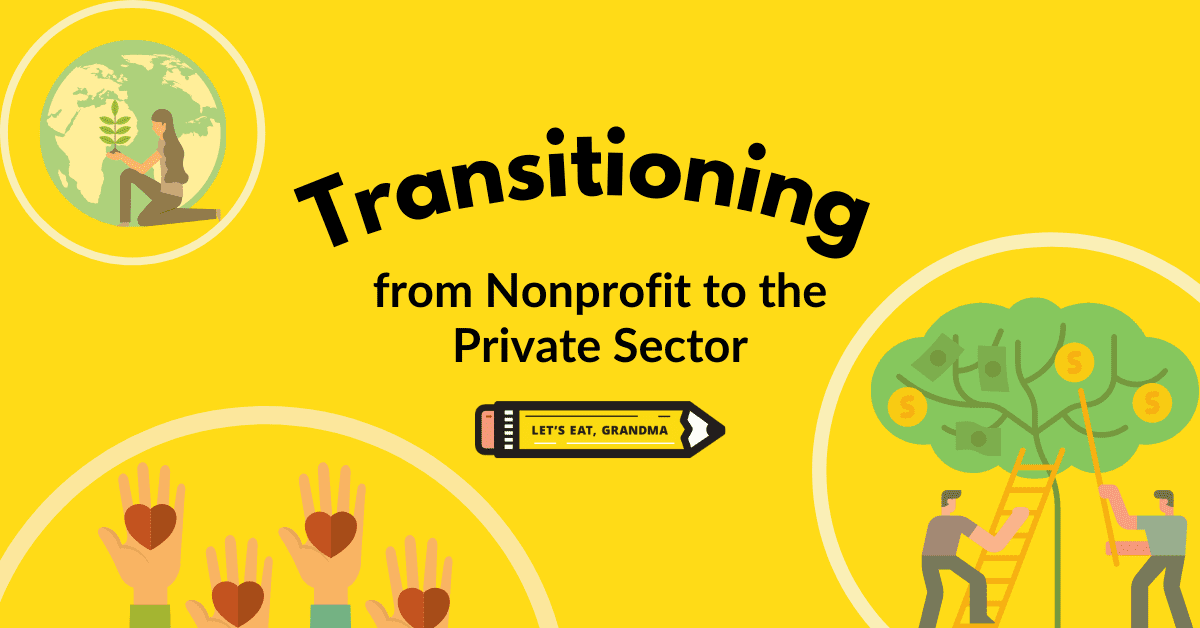Transitioning from the Nonprofit Sector to the Private Sector

Making the leap into the private sector after time spent in the nonprofit world requires a mindset change and a resume refresh. Here’s how to spruce up your resume, cover letter, and LinkedIn profile to highlight the experience and qualities that will position you as a well-rounded candidate.
By: Grace Mitchell | Contributor for Let’s Eat, Grandma
Working for a nonprofit organization and considering a career change? You’re not alone. A new study from Nonprofit HR reveals an “alarming” trend on the horizon for nonprofit organizations around the U.S. – 45% of responding nonprofit employees indicated that they will seek new or different employment in the next five years. Of that group, 23% said that nonprofits would not be among the types of organizations they intend to pursue.
Ready for more job search help?
Sign up for a free Senior Writer Resume Critique to see what's holding you back from landing interviews. One of our top professional resume writers will give you personalized feedback on the top 3 items you can improve based on our expert practices!
Whether you’re struggling with your employer’s response to compassion fatigue, longing to work for an organization that’s a bit more, well, organized, or you’re just ready for a change, Grandma is here to help you successfully transition from nonprofit work into the world of for-profit business.
Emphasize Transferable Skills

Long hours spent working on difficult projects with limited funding can lead to nonprofit compassion fatigue. Photo by Victoria Heath on Unsplash.
When transitioning from one sector to another, transferable skills are a must. So-called soft skills are difficult to teach, so if you have them, write about them in your resume and especially your cover letter! Even if you haven’t had much experience in the business sector, pick out certain parts of your nonprofit jobs that most showcase the skills you’re going to need.
For example, coordinating your nonprofit’s annual fundraiser requires both project management and leadership skills. Working with a volunteer team requires collaboration, while brainstorming how to operate on a tight budget calls for both flexibility and critical thinking. Not sure what transferable skills you have? Check out this list!
Showcase Your Mission and Passion
Let your passion shine through in your cover letter! Coming from the nonprofit sector, it’s likely that a drive for mission and passion for people fueled your daily work. You may think your hiring manager won’t be interested in the passion you bring, but these qualities are valuable even in a for-profit business.
Take the time to research the company you’re applying to. What is their mission, and how does it align with yours? Reflecting on these questions in your cover letter demonstrates your dedication, which, like transferable skills, can’t really be taught.
Update Your LinkedIn

It’s important to update your LinkedIn profile before sending out any job applications. Photo by inlytics | LinkedIn Analytics Tool on Unsplash.
Regardless of what industry you’re transitioning into, you need a LinkedIn profile. Why? LinkedIn statistics show that 55 million companies use the quickly growing site, and three people are hired through LinkedIn every minute.
Take the time to fill out each section of your profile; in fact, fill it to the brim. Unlike your resume, which should be a short highlight reel of your career, your LinkedIn profile has hiding and scrolling features. Potential employers are free to view as much or as little of your profile as they want to. While it should be targeted toward the jobs you’re currently applying to, your profile is a great place to add supplemental info and additional accomplishments that otherwise wouldn’t fit on your resume.
Missing Something?
Does a certification you don’t have keep coming up in job descriptions? You may want to consider adding it to your resume. Many certifications are less than $100 and can be completed at your own pace. They can also set you apart from your competition, so getting certified in a particular skill or program can be a valuable investment when shifting into a new industry.
What Should You Leave Out?
Nonprofit employees tend to “wear many hats” and may have experience with disorganized, unpredictable, or underfunded environments. If this applies to you, you may be tempted to go in-depth in your resume or cover letter to reassure your potential new employer that you’re resourceful, flexible, and/or work well under pressure. Keep in mind, though, that speaking ill of a former employer is still frowned upon.
Even if you were the sole reason your nonprofit stayed afloat, saying so outright will reflect poorly on your character rather than positively reflect your work ethic to a hiring manager. Find ways to shift your language to highlight your success rather than your former nonprofit’s failure.
For example, “Formed 10 new community partnerships, securing $50,000 funding in one month” speaks much more to your experience than “Led company fundraising efforts after head funding coordinator was abruptly laid off.” If saying something negative about the nonprofit is unavoidable (say you were the one who was abruptly laid off), be sure to remain objective when conveying the information, then follow it with a positive spin.
Onward and Upward
While breaking into a new industry can be difficult, don’t discount the valuable experience you bring to the table coming from a nonprofit! Your passion, ingenuity, and skills have taken you far, and they’ll serve you well in this new chapter, too.
Ready for more job search help?
Sign up for a free Senior Writer Resume Critique to see what's holding you back from landing interviews. One of our top professional resume writers will give you personalized feedback on the top 3 items you can improve based on our expert practices!
Better Resume.
Satisfying Career.
Happier You.
